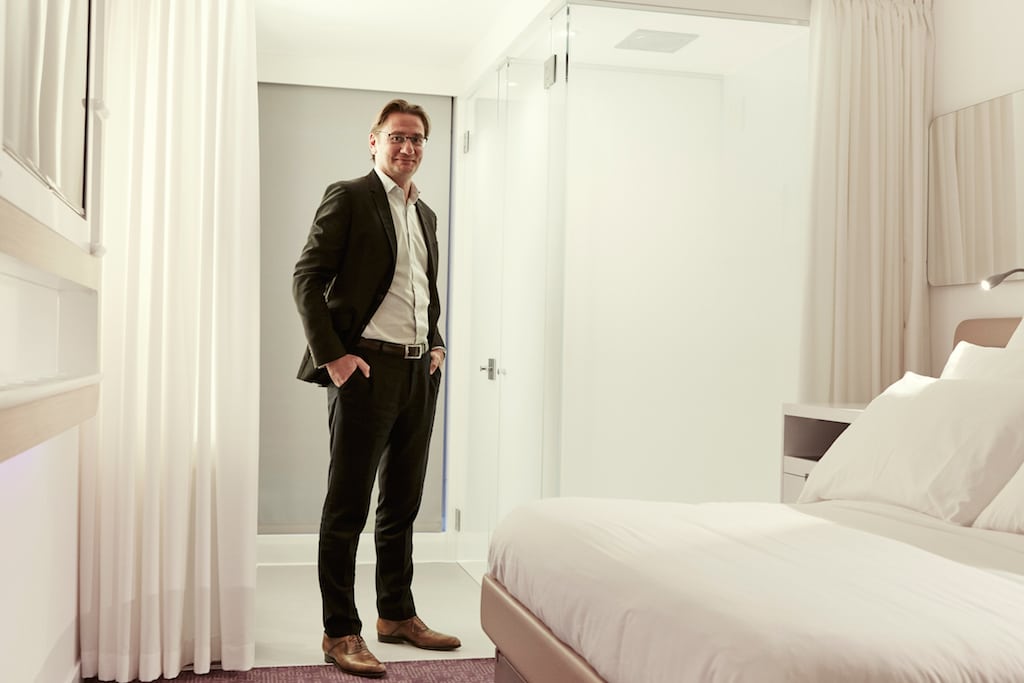Yotel CEO Sees an Opening Between Airbnb and Old School Hotels

Skift Take
Known for its small rooms and high-tech guest experience, Yotel has 12 new management contracts in the pipeline, including 10 city hotels primarily in the U.S., and two airport properties at Paris Charles de Gaulle Airport and Singapore Changi Airport.
Paris will be the first of the bunch to open in November.
Hubert Viriot, CEO of Yotel, told Skift that the reason behind the sudden expansion of the Yotel brand is the extended rise of Airbnb and more favorable market conditions over the last few years.
He explained that investors are finally seeing the value in compact, efficient, affordable, design-forward, technically advanced, full-service hotels in major urban markets as an alternative to Airbnb and other room-sharing platforms. The less amount of real estate per key is particularly attractive to investors, now that they realize there's a strong market.
Yotel New York opened in Manhattan's Hell's Kitchen in 2011, with the majority of the 669 "cabins" running around 170 square feet. That's about half the average size of hotel rooms in North America, and still well below New York's typically small guest rooms.
"What people need is efficiency, an experience, a high level of comfort, connectivity, a great location, and friendly service," Viriot said. "Yotel offers everything our guests need but nothing they don't need. What they don't need is a huge amount of space because their stay is short, and they'll be busy for work-related matters or leisure activities."
The New York property is presently the only city-based Yotel. The two "YotelAir" airport properties are based at London Heathrow and Gatwick, where the smallest rooms start at 100 square feet, which are bookable by the hour.
The average rate at Yotel New York is $200 over the year, ranging from $140 to $300 nightly depending on season. Sample airport pricing is $49 for four hours at Gatwick.
The sweet spot for the brand is the traveler who wants the cost and consumer-centric user experience inherent in room-sharing properties, combined with the consistency of a recognizable hotel flag.
"Generally, lower-priced rooms come with a lower level of quality, and doesn't usually look very good, "Viriot said. "Airbnb helped change that perception. So we position ourselves as a smaller space but with greater quality, or affordable luxury. We're young and new and that allows us to take modern trends into consideration."
Airline Cabin Theme
Aircraft cabin manufacturers designed the pre-fab Yotel guest room interiors, and an airline website designer created the Yotel website.
The aviation influence is an attempt to evoke the stylish efficiency of today's first-class airline environments, with integrated technology and intelligent ergonomics that cocoon the body. In effect, the Yotel guest room is a bit like a Virgin Atlantic Upper Class cabin with nice glass showers.
There's also a "tech wall" video and music entertainment unit with a flip down desk, and a bed that slides up into a couch. The color palette is monochromatic, consisting of white, beige, and purple throughout the brand.
"We don't really do local," Viriot said.
All of this is meant to convey a sense of modernity that transcends location and aligns with the next generation traveler's sense of seamless worldwide mobility.
Supporting that, the Yotel app launched about a year ago, helping drive about 35 percent of direct bookings across the brand portfolio. Guests can also use the app for early check-in/late check-out, a digital room key, and a evolving list of neighborhood interests for all types of travelers.
Yotel's guest mix is 55 percent leisure, 45 percent corporate.




